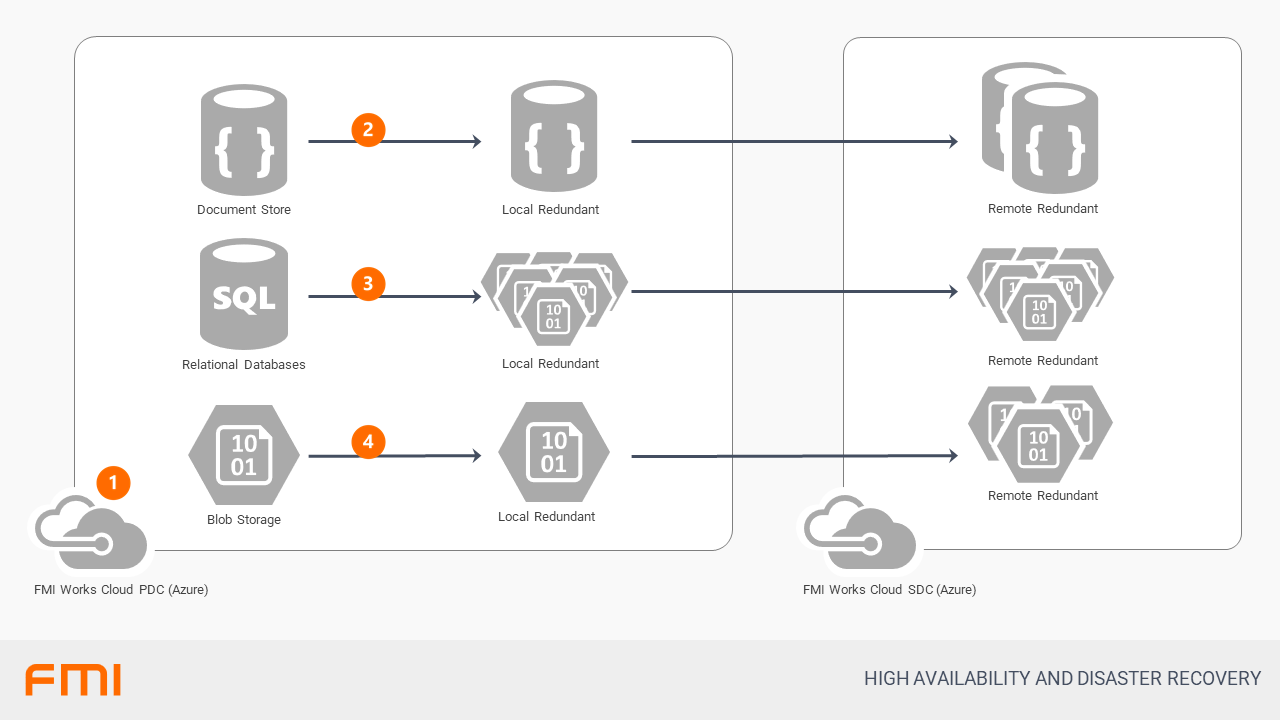High Availability / Disaster Recovery (HA/DR)
Describes how FMI Works provides highly available access to systems and data and can respond to natural and man-made disasters.
This article is for IT and security professionals
The FMI Works environment is built on top of the Microsoft Azure cloud environment. This allows for industry best availability and recovery options, but still requires that systems are configured properly to take advantage of them.

- FMI Works uses the Australia East Zone (located in Sydney) as the Primary Data Centre (PDC); and the Australia Southeast Zone (located in Melbourne) as the Secondary Data Centre (SDC).
- Data that is stored in document format is stored using the DocumentDB feature of Microsoft Cosmos DB. This extremely flexible model has been configured to use two data centres. The PDC maintains three copies if all documents. The SDC is configured to maintain three additional copies in a high-speed, eventually consistent model.
- Microsoft manages the High Availability of these copies as part of their service.
- Backups are taken every 24 hours, with daily backups of documents being retained 30 days.
- For additional information, see https://docs.microsoft.com/en-us/azure/cosmos-db/regional-failover
- Data that is stored in relational database format is stored using the SQL Azure database (based on SQL Server, but hosted in Azure). This model is HA and DR by default.
- Microsoft manages the High Availability of this database as part of their service.
- Full Backups are made every month and retained for 6 months.
- A total of 12 copies of the backups are maintained across the PDC and the SDC.
- In the case of a natural disaster, recovery to the SDC is managed by Microsoft.
- In the case of malicious or accidental disaster, FMI Works can recover data within a database as data is internally audited. This is part of an overall soft-delete policy on data.
- Additionally, FMI Works has the option of recovering any database via incremental backups to any point in time in the past 35 days. This is our secondary policy as our audit are maintained in the database and this process removes recent audit history.
- For additional information, see https://docs.microsoft.com/en-us/azure/sql-database/sql-database-automated-backups
- Blob storage is replicated using the Geo-Redundant Storage (GRS). In this model, 3 copies of data are maintained in the PDC; of which 1 copy is on a physically separate storage device. This allows for both sector failure as well as device (or even rack) failures. Additionally, 3 additional copies are asynchronously made to the SDC.
- Microsoft manages the High Availability of these copies as part of their service.
- In the case of a natural disaster, recovery to the SDC is managed by Microsoft.
- In the case of malicious or accidental disaster, FMI Works keeps time based backups of blobs. This is part of an overall soft-delete policy on data.
- For additional information, see https://docs.microsoft.com/en-us/azure/storage/storage-redundancy
FMI Works provides and uptime service level of 99.9% for products delivered through our SaaS environment.
DDoS Protection
In addition to the above architecture, FMI Works is protected from Distributed Denial of Service (DDoS) attacks using Microsoft Azure's Traffic Manager.
There is no additional cost to clients for this protection, and all costs for ingress/egress of data are included in the license cost of FMI products.